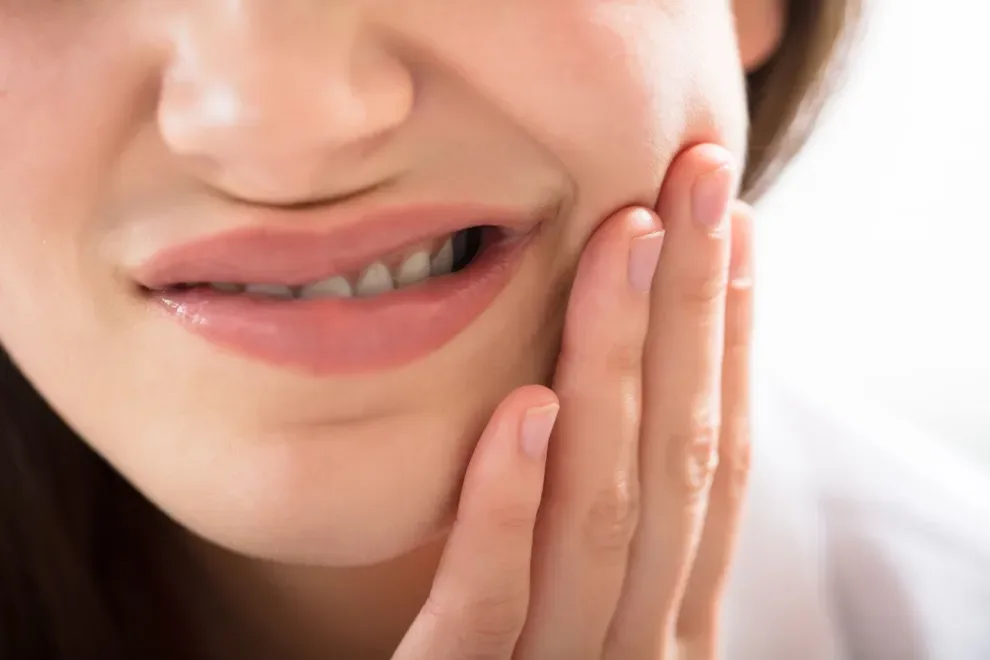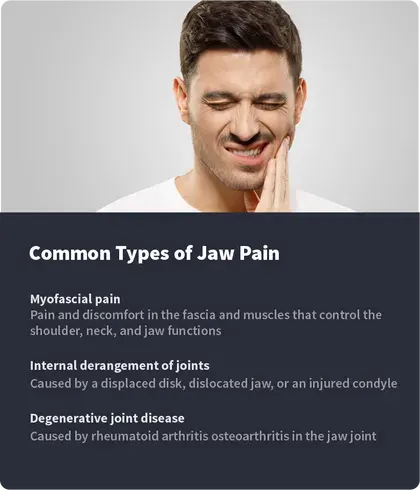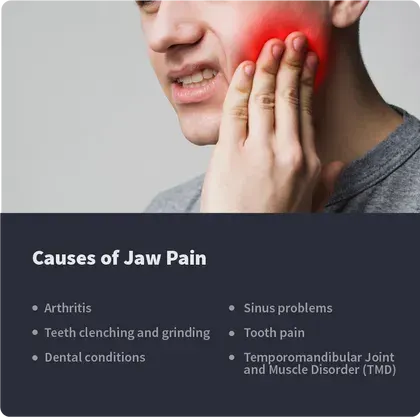What Causes Jaw Pain and How Is it Treated

Table of Contents
- TMJ & Jaw Pain
- Common Types of Jaw Pain
- Jaw Pain Symptoms
- Causes of Jaw Pain
- When To See A Doctor
- References
Jaw pain can be caused by many issues, including sinus problems, tooth infections, arthritis, injury, TMJ, and gum disease (periodontitis).
The treatment for jaw pain will be dependent on the specific cause. Initial visits with a dentist or other dental professional will aim to identify the root cause.
If you’ve been experiencing jaw pain, you’re not alone. According to the National Institutes of Health, over 10 million people in the U.S. experience jaw dysfunction and jaw pain.
TMJ & Jaw Pain
One of the most common causes of jaw pain is teeth grinding (bruxism), which may be related to another leading cause of chronic jaw pain, TMJ (temporomandibular) disorders. TMJ disorders may also be referred to as temporomandibular joint syndrome.
The temporomandibular joints (TMJ) are two joints connecting the mandible (lower jaw) to the skull. Along with several other muscles, the temporomandibular joints allow the mandible to move side to side and up and down. This movement helps you to chew, swallow, talk and yawn.
Temporomandibular joint syndrome affects the normal functioning of these joints. Consequently, the condition interferes with the joint’s functionality.
Common Types of Jaw Pain
According to the National Institute of Dental and Craniofacial Research, about 11% of Americans suffer from jaw pain. This jaw pain can be classified into various categories, including:

Myofascial pain. Considered one of the most common types of jaw pain, myofascial pain causes pain and discomfort in the fascia and muscles that control the shoulder, neck, and jaw functions. The fascia is a connective tissue that covers most muscles.
Internal derangement of joints. This is a condition caused by a displaced disk, dislocated jaw, or an injured condyle. The condyle is the rounded end located between the jawbone and the base of the temporal skull bone.
Degenerative joint disease. This condition is caused by rheumatoid arthritis osteoarthritis in the jaw joint.
It’s worth noting that jaw pain can be caused by one or more of these conditions at the same time.
Jaw Pain Symptoms
Physical injuries, infections and damaged nerves and blood vessels can all lead to a painful jaw. Temporomandibular joint disorder refers to a cluster of conditions that affect the muscles, joints, and bones attributed to the jaw’s movement.
In some cases, pain subsides with time and no medical intervention is required. But there are instances in which these conditions lead to chronic pain and discomfort. Chronic pain is a signal to seek medical help.
Depending on the level of discomfort and how long the pain lasts, you can evaluate if you should get medical assistance or wait to see if the pain subsides on its own.
Symptoms associated with jaw pain vary. Common symptoms include the following:
Teeth clenching or grinding
Jaw locking
Difficulty opening your mouth or chewing
Sensitive teeth
Pain in the jaw and face
Burning sensations inside your mouth
Popping, grinding, or clicking sounds
Stress reduction can help reduce jaw pain, and it is suggested to try stress-relieving techniques to reduce jaw clenching, such as yoga, reflection journal, and meditation.
Causes of Jaw Pain

Some of the potential causes of a painful jaw include arthritis, teeth clenching and grinding at night, sinus issues, tooth issues and temporomandibular joint and muscle disorder.
Various types of arthritis, such as osteoarthritis, can cause wear and tear to the jawbones and the smooth interface between them. As a result, the increased pressure exerted leads to bone pain.
Additionally, inflammatory conditions may cause inflammation, leading to jaw pain when the jaw bone joint is affected. These inflammatory conditions include psoriatic arthritis, rheumatoid arthritis, and synovitis.
Some people are prone to clenching or grinding their teeth either when stressed or asleep. This condition is known as bruxism and can significantly contribute to jaw pain and teeth damage.
Various dental and mouth hygiene conditions can cause chronic jaw pain. These include damaged teeth, tooth gaps, gum disease, abscesses, and cavities.
Sinus cavities are located close to the jaw and are full of air cavities. When the sinuses are affected with viral or bacterial germs, they produce excess mucus. This excess mucus exerts pressure on the jaw, resulting in pain and general discomfort.
Dental abscesses are severe tooth pain that leads to pain that often concentrates in the jaw. When left unchecked, tooth pain can result in jaw discomfort.
Affecting well over 11 million Americans, TMDs are among the leading causes of jaw pain. Temporomandibular joints are located on each side of the jaw and can be affected independently or together.
Several factors are attributed to temporomandibular joint and muscle disorder, such as these:
Injury to the jaw joints
Arthritis in the protective joints responsible for cushioning the jaw joint
Overstimulation of the jaw joint
Pain from the muscles controlling the jaw's movement
There are numerous anecdotal remedies that can be used to alleviate jaw pain and treat temporomandibular joints and muscles disorder. These are some common home and medical remedies:
Place an ice pack on the affected area.
Use soothing essential oils, such as clary sage, chamomile, lavender, and sweet marjoram.
Take over-the-counter nonsteroidal anti-inflammatory drugs (NSAIDs), such as naproxen and ibuprofen. Other pain relief medications, such as acetaminophen and aspirin, may also be used.
Try gentle massage and self-stretching exercises for the neck and jaw muscles.
Medical marijuana can be used in states where it is legal to help manage TMD pain.
In extreme cases, minimal dental surgical procedures may be used.
When Should You See a Doctor Because of Jaw Pain?
You don't necessarily need to see a doctor when you have jaw pain, but there are times when you should. See a doctor if you experience the following:
You've tried home remedies with no success. Your jaw still hurts.
Jaw pain interferes with your day-to-day activities.
You experience pain in your upper back or neck.
You suffer from dental issues, such as broken teeth.
You start experiencing eye pain, headaches, or vision impairment.
There's a noticeable change in how your jaw moves or your teeth line up.
You should also get to the doctor’s office if you have long-term pain in your jaw. If your pain is chronic, you need a medical diagnosis.
